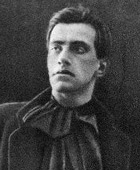Born in 1893 in the Georgian village of Bagdadi (which was renamed Mayakovsky after his death), Vladimir Mayakovsky was the son of a forestry officer. By the time of the 1905 revolution Mayakovsky was already working with the local Social Democrats, and when his family moved to Moscow a couple of years later he joined the Bolsheviks. He did propaganda work for the party until his arrest in 1908, which resulted in an imprisonment of eleven months.
The imprisonment was crucial to his artistic and political development, as he spent the time reading the classics of world literature. Nevertheless, upon leaving prison he became a key figure of the artistic avant-garde in Moscow, becoming a Futurist, an artistic movement resolutely opposed to all that was old and bucolic, and which praised the city, speed, and modernity. As their manifesto said: “We alone are the face of our time. Time’s trumpet blares in our art of words. The past is stifling…Throw Pushkin, Dostoevsky, Tolstoy, etc, overboard.”
From this time until the revolutions of 1917 Mayakovsky was one of the most visible members of the Russian artistic scene. He wrote rough, declamatory poetry and cultivated the image of a hooligan, and poems he wrote during this period, like “ The Cloud in Trousers” and “I,” were among the most important of the time.
Though Futurism in its original Italian form led directly to fascism, Mayakovsky’s combination of Futurism and residual Bolshevism led him to welcome the October Revolution, and he put his considerable talents at the service of the new state. He produced posters, films and political poems in order to reach as broad a mass as possible. The death of Lenin profoundly moved him, and he gave countless readings in factories, clubs, and at party meetings around the Soviet Union of his poem “Vladimir Ilyich Lenin.”
But he didn’t deny settle into a populist mode, and was a leading light of LEF , the Left Front in Literature, which included all the modernist figures in the Soviet arts world. When their magazine folded Mayakovsky traveled to Europe and the US in 1925-26, a trip which left him hating capitalism even more. It was this period that gave birth to poems like “Back Home,” where he asked “Gosplan to sweat/ in debate/ assigning me goals a year ahead.”
But he refused to see Soviet reality in strictly rosy colors, at one point even going so far as planning to write a poem entitled “Bad,” and in 1928 he wrote “The Bedbug,” a play that criticized the NEPmen of the previous years, while holding out the hope of a beautiful communist future. A critical failure, he followed it two years later with a more openly critical play about Soviet reality, “The Bathhouse,” which, after being turned down by Soviet censors, was reworked, mounted, and critically savaged, a writer for Pravda going so far as to say he was playing the Trotskyist’s game.
Though he tried to defend himself in poetry in “At the Top of My Voice,” the attacks on “The Bathhouse,” and the threats implied by the constant attacks by RAPP, the Federation of Proletarian Writers, broke him physically and morally. He had also always had an emotionally stormy romantic life, including a long and intense affair with Lily Brik, a married woman whose sister Elsa was later to marry the French Communist poet Louis Aragon. All was coming apart at once, and after a stay in a rest home he, who had harshly criticized the poet Sergei Esenin for taking his own life in 1925, committed suicide on April 14, 1930. In his suicide note he wrote: “Do not blame anyone for my death and please do not gossip. The deceased terribly dislike this sort of thing. Mamma, sisters and comrades, forgive me — this is not a way out (I do not recommend it to others), but I have none other. Lily — love me…Comrades of VAPP [the all-union organization of RAPP] — do not think me weak-spirited. Seriously — there was nothing else I could do. Greetings.”
Mitch Abidor |






